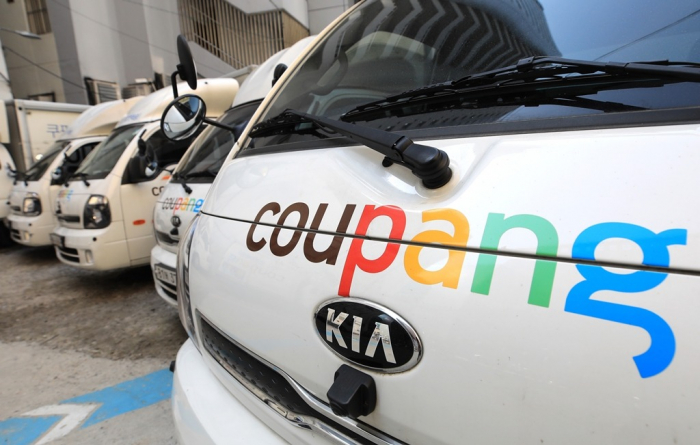E-commerce
Mounting deficits, time bomb for Korean e-commerce biz
Difficulties in funding amid sustained losses may put some e-commerce companies at risk – analysts
By May 30, 2023 (Gmt+09:00)
3
Min read
Most Read
LG Chem to sell water filter business to Glenwood PE for $692 million


Kyobo Life poised to buy Japan’s SBI Group-owned savings bank


KT&G eyes overseas M&A after rejecting activist fund's offer


StockX in merger talks with Naver’s online reseller Kream


Mirae Asset to be named Korea Post’s core real estate fund operator



Major South Korean e-commerce companies’ deficits have mounted to a level near their combined funds raised from investors, stoking fears that some may not survive.
The country’s eight large online retailers, including e-commerce giant Coupang Inc. and gourmet food delivery platform Kurly Inc., reported combined net losses of 10.8 trillion won ($8.2 billion) as of end-2022, according to their business reports.
Coupang logged a deficit of 6 trillion won, Kurly reported a deficit of 2.1 trillion won, while TMON Inc. and WeMakePrice Inc. suffered deficits of 1.3 trillion won and 657.6 billion won, respectively. SSG.COM, the e-commerce brand of domestic retail giant Shinsegae Inc., logged a deficit of 289.8 billion won.
The total deficit was around the amount of their combined capital surplus, money secured from fundraising measures such as rights offerings, indicating they have almost exhausted funds from investors.
The deficits of seven of them except Coupang, which was expected to turn to the black this year, are predicted to mount further, analysts said.
“Most e-commerce, which focused on business expansions during the COVID-19 period, face a deficit time bomb now,” said Seo Yong-koo, a business professor at Sookmyung Women's University in Seoul. “Some of them are likely to hit the wall this year as they stay in the red and fail to raise more money.”
South Korea’s e-commerce companies raised 24.2 billion won in the first four months of this year, down more than 90% from a year earlier, according to Startup Alliance, a local industry organization.
SATURATED MARKET
Those online retailers earlier actively invested to expand their market shares in the saturated local market.
Kurly, SSG.COM and Lotte Shopping Co. heavily spent on large logistics centers and marketing to lure customers in online markets, for example, believing that such investments would result in profits.
“The domestic e-commerce market has already entered an oligopolistic stage,” Seo said. “It will be hard to achieve economies of scale through overwhelming growth unless the entire market increases.”
E-commerce accounted for 26.7% of the total retail sales last year in the country, up merely 0.1 percentage points from 2021. The e-commerce penetration rate rose about 3 percentage points in 2020 when customers preferred online shopping due to COVID-19.
Growth in online sales of local retailers nearly halved to 9.5% last year from 18.4% in 2020, while offline revenues rose 8.9% after dropping 3.6% during the period, according to Statistics Korea.
Food delivery platforms, which had enjoyed a boom during the pandemic, were set to suffer weakening profitability with the monthly active users of major players such as Baedal Minjok of Germany’s Delivery Hero SE down 11.9% in April on-year.
LIQUIDITY DRIES UP
It has become tougher for e-commerce companies to raise funds as investors are more reluctant to spend money amid a slowdown in Asia’s fourth-largest economy.
“No one wants to pour water into a bottomless pit when liquidity in the investment sector has dried up amid an economic downturn,” said an industry source.
Kurly indefinitely postponed its listing on the country’s main Kospi in January, while Oasis Corp., a grocery delivery platform, dropped its initial public offering in February on weak demand.

“They gave up listings as they could not raise as much money as expected as the rosy outlook on the e-commerce sector disappeared like a mirage,” said an investment industry source.
SSG.COM and 11Street have been seeking IPOs, but they are unlikely to go public this year given soured investor sentiment, industry sources said.
Such tougher funding conditions and sustained losses put some operators at risk. Mesh Korea Co., a delivery service operator, barely avoided bankruptcy after filing a court receivership in November 2022 as it was acquired by hy Co. earlier this year, formerly Korea Yakult.
Some e-commerce companies shifted their focus to profitability from growth to deal with tougher business conditions.
Lotte On, Lotte Shopping’s online mall, dropped dawn delivery services, while SSG.COM decided to operate such services only for the capital Seoul and surrounding areas.
Write to Hun-Hyoung Ha at hhh@hankyung.com
Jongwoo Cheon edited this article.
More to Read
-
 Mergers & AcquisitionsS.Korea’s hy buys Mesh for Vroong delivery service
Mergers & AcquisitionsS.Korea’s hy buys Mesh for Vroong delivery serviceFeb 24, 2023 (Gmt+09:00)
1 Min read -
 IPOsS.Korean grocery delivery platform Oasis drops IPO on weak demand
IPOsS.Korean grocery delivery platform Oasis drops IPO on weak demandFeb 13, 2023 (Gmt+09:00)
1 Min read -

-

Comment 0
LOG IN


